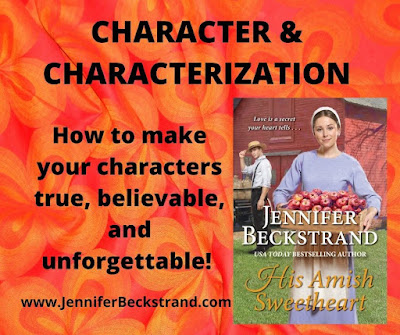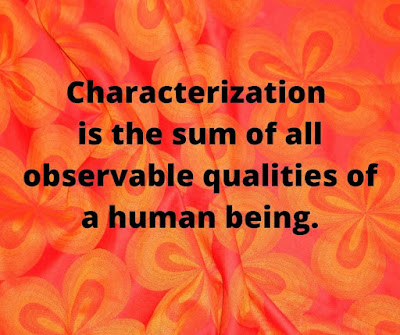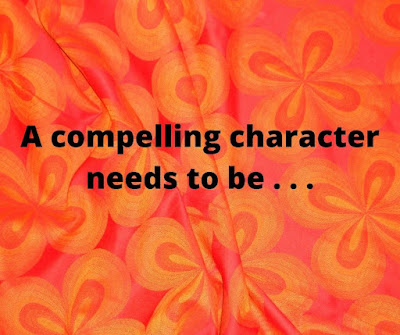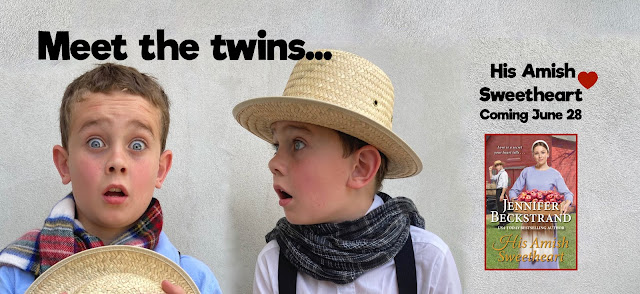Hi Dear Friends! Debby Giusti here to introduce Jennifer Beckstrand, a Bestselling Author of Amish Stories, who is blogging with us today. She's written an amazing post that I'm sure you'll enjoy.
Character and Characterization: How to make your characters true, believable, and unforgettable!
Join me in giving Jennifer a warm Seekerville welcome!
Here's Jennifer:
I’m so excited
to be here today to talk about one of my very, very favorite topics: writing
great characters.
Have you seen the movie “Hitch” with Will Smith and Kevin James? If you haven’t or even if you have, watch this scene on YouTube where we’re introduced to Albert Brenneman: https://www.youtube.com/watch?v=MIBzVc3kJAM
Be sure to come right back to join in the discussion.
Albert Brenneman is one of my favorite characters ever. In the movie, the director does several things to reveal Albert’s character to us and more importantly, make him instantly likable.
· Albert spills mustard on his pants—This immediately makes him relatable. We’ve all felt klutzy on occasion.
· He
displays wide-eyed hope, and we can tell he sincerely likes the girl he wants
to get together with. This makes him likable.
· He
doubts himself again and again and has us rooting for him from the very
beginning. This makes him vulnerable.
· He
doesn’t have a perfect body or perfect hair. He wears glasses, and he gets down
on himself for saying the wrong thing. This makes him believable.
Think of your favorite characters in books and movies. Why are they your favorites?
I could spend three weeks talking about how to create amazing characters, but none of us have that much time, so I’m going to focus on just a few aspects of creating great characters.
#1 Characterization is the sum of all observable qualities of a human being.
Character and
characterization are different. Some people call characterization the driver’s
license information. I like to think of characterization as the first few
layers of a character.
Characterization can reveal character or hide it. What are some characterizations of Albert Brenneman in the above YouTube clip that reveal character?
· His
photo: He’s awkward
· His
clothes: He’s a professional but not a player
· His
insecurity: He’s vulnerable, sincere, and lovable
#2 True Character is revealed in the choices a human being makes under pressure—the greater the pressure, the deeper the revelation, the truer the choice to the character’s essential nature.
What choices
does Albert make in this scene that reveal more of his character?
He
is eager to give Allegra a pen, he gets frustrated, he decides to walk away.
What choices does Hitch make that reveal more of his character?
He listens, he laughs, he
encourages, he’s kind
Pressure and conflict often reveal a person’s true character. “Pressure is essential. Choices made when nothing is at risk mean little.” (Story by Robert McKee)
Robert McKee gives a good
example of pressure revealing character:
Consider this scene: Two
cars motor down a highway. One is a rusted-out station wagon with buckets,
mops, and brooms in the back Driving it is an illegal alien- a quiet, shy woman
working as a domestic for under-the-table cash, sole support of her family.
Alongside her is a glistening new Porsche driven by a brilliant and wealthy
neurosurgeon. Two people who have utterly different back- grounds, beliefs,
personalities, languages-in every way imaginable their characterizations are
the opposite of each other.
Suddenly, in front of them,
a school bus full of children flips out of control, smashes against an
underpass, bursting into flames, trapping the children inside. Now, under this
terrible pressure, we'll find out who these two people really are.
Who chooses to stop? Who
chooses to drive by? Each has rationalizations for driving by. The domestic
worries that if she gets caught up in this, the police might question her, find
out she's an illegal, throw her back across the border, and her family will
starve. The surgeon fears that if he's injured and his hands burned, hands that
perform miraculous microsurgeries, the lives of thousands of future patients
will be lost. But let's say they both hit the brakes and stop.
This choice gives us a clue
to character, but who's stopping to help, and who's become too hysterical to
drive any farther? Let's say they both choose to help. This tells us more. But
who chooses to help by calling for an ambulance and waiting? Who chooses to
help by dashing into the burning bus? Let's say they both rush for the b u s -
a choice that reveals character in even greater depth.
Now doctor and housekeeper
smash windows, crawl inside the blazing bus, grab screaming children, and push
them to safety. But their choices aren't over. Soon the flames surge into a
blistering inferno, skin peels from their faces. They can't take another breath
without searing their lungs. In the midst of this horror each realizes there's
only a second left to rescue one of the many children still inside. How does
the doctor react? In a sudden reflex does he reach for a white child or the
black child closer to him? Which way do the housekeeper's instincts take her?
Does she save the little boy? Or the little girl cowering at her feet? How does
she make "Sophie's choice"?
#3 A compelling character needs to be
Likable
Believable
Relatable
Vulnerable
Not all characters in your book are going to be all of these, especially your villains, but remember that your villain is the hero of his own story. Your main protagonist should be all of these things:
Likable
Is the
protagonist someone the reader can root for? I love the first scene in “Iron
Man” when Tony Stark is riding in the Humvee with a bunch of soldiers. The way
he talks and relates to the other soldiers makes him immediately likable.
Albert Brenneman is another character that I think is instantly likable.
However, your protagonist doesn’t have to be likable all at once. (Think
Ebeneezer Scrooge or Mr. Darcy.) In one of my first Amish books, Miriam’s
Quilt, Miriam is quite a snob, but life hands her some setbacks, and she
comes to know herself. Then we really start rooting for her.
Believable
Is your heroine
too good to be true? Too bad to be true? One T.V. series I loved to watch was Poldark,
because I thought Ross Poldark was both deeply good and deeply flawed. I really
soured on the series when Ross did something that I thought was out of
character—I didn’t find him believable anymore. If you create a 75-year-old
granny who fights off bad guys with her fists, you’d better show us that she
works out five hours a day and drinks protein shakes for breakfast, lunch, and
dinner.
Relatable: You want the reader to say, “I totally understand. I’ve been there.” If your characters are too perfect, the reader can’t relate to them. That’s one of the reasons I love the above scene from Hitch. Albert spills mustard on his pants. Most of us have done that and sometimes before a very important appointment or meeting.
Vulnerable: This can mean broken, weak, flawed, or all three. Many of the greatest protagonists are deeply flawed: Sydney Carton in A Tale of Two Cities, Edmund Dantes in The Count of Monte Cristo, and Katniss Everdeen in The Hunger Games. Harry Potter is vulnerable because he is a child. Children are easy to make vulnerable. It’s a little harder to do with adults.
These four things add up to characters that readers care about. Of course, this doesn’t apply to all characters, but readers must care about what happens to your main characters.
Several years ago, I saw the movie “All Is Lost” with Robert Redford—and only Robert Redford. Who doesn’t love a Robert Redford movie? As it turned out, “All Is Lost” was a mediocre movie because even though Robert Redford was stranded at sea in a dire situation, I didn’t care what happened to him. Why not? Because the writer and direction didn’t develop his character. I didn’t know who this “man in peril” really was. And so, I didn’t care. Here is part of a review of “All Is Lost” that expressed it perfectly:
Who is this sailor? Where does he come from? Chandor (the director) never sees fit to tell us. His hero remains a deliberate stencil, defined solely by the crisis around him and the actions he takes. Ironically, given the abundance of ocean, All is Lost is an entirely depthless drama. Here is a film that exists purely in the moment, bouncing us inexorably from the bad to the worse. There is no journey towards redemption and no cozy life lesson lying in wait at the end. There's just the sea and the sky and the struggle to survive.
Plot is essential, but it is well-written characters that really make a great book.
I hope you’ll check out the characters in my next book, His Amish Sweetheart, which comes out June 28. Eight-year-old twins Alfie and Benji Petersheim will do anything to get rid of their brother—even find him a wife.Don’t miss this delightful love story about friendship,
second chances, and smoke bombs. You’re going to fall in love with the characters!
Preorder His Amish Sweetheart on Amazon, Walmart, and Barnes
and Noble.
Facebook: https://www.facebook.com/jenniferbeckstrandfans
Amazon: https://www.amazon.com/Jennifer-Beckstrand/e/B0073GHCOG/ref=sr_tc_2_0?qid=1488910908&sr=8-2-ent
Instagram: j.beckstrand
Bookbub: @JenniferBeckstrand https://www.bookbub.com/authors/jennifer-beckstrand






Jennifer, this is a good teaching and something I need right now as I exhume my WIP and give it another shot. My first three books and two novellas were very organic -- I knew the characters and the stories grew out of who they were. My work on those was mostly on the plotting end. My current WIP, which is more W and I than P at the moment, is the exact opposite. It's a historical with a lot of moving parts, so I got really caught up in the plotting and didn't go deep enough with the characters. But there are always second chances...
ReplyDeleteWhat intrigues me about Amish fiction is that, logically, you writers of Amish must have to work harder to create memorable characters, because the externals of your people's lives are almost identical -- same clothes, same jobs, same customs. How do you bring an AMISH character to life?
I'm having a pretty good week here considering that I had two sets of galleys to plow through for two different projects. Blessed to be able to do it at all.
May be back later.
Kathy Bailey
Their Kaybee
Working it all out in New Hampshire
Kathy Bailey
KB, you're a busy writer! Jennifer's stories are wonderful, and her characters are so well formed. I hope her blogpost today has provided helpful tips on how to make your characters come alive!
DeleteKathy! Goodness, you have a lot going on. Yes, I feel like my Amish characters need to be very well-defined because everybody thinks the Amish are all alike, and in some ways they are. But they're mostly just like everybody else--seeking to do their best, sometimes failing and sometimes succeeding.
DeleteHi Jennifer! Wow! This post is full of great info on character development. I really love the vulnerable aspect. Seeing our characters' hearts revealed is always poignant.
ReplyDeleteYou're so right, Dana!
DeleteThanks, Dana! I think character is at the heart of every good story.
DeleteJennifer, my reaction was the same as Dana's. WOW! WOW! WOW! I need to dig out my copy of STORY! You had me literally holding my breath wondering what choice each character would make, and then upping the stakes! Thanks for such a wonderfully inspirational post.
ReplyDeleteI need to read Story too. It's on my shelf. Read in part, but not the entire book. Shame on me!
DeleteThank you, Cate. I really, really love that book. Mine is all marked up.
DeleteOh, my goodness. Finding their brother a wife. I'm hooked already.
ReplyDeleteJennifer, I found myself engrossed in your post. Perhaps because I love the movie Hitch, in part because of Albert. Now I'm going to have to watch it again. Soon! This is one of those posts I need to print and review. So many good points. Thank you for joining us on Seekerville!
Hitch had a lot of good points that work for writers. I agree about thanking Jennifer for this excellent post.
DeleteHow kind, Mindy! Thank you so much. I need to watch Hitch again too. It's one I watch often because I love the characters. So happy to be here.
DeleteA master class on character! Have you taught this as a workshop! It would be amazing!
ReplyDeleteIt would make a great class, Erica.
DeleteErica, I have taught this as a workshop! I left a lot out in this post. Maybe I need a part 2. :)
DeleteThis is a wonderful post, Jennifer! I've never seen Hitch, but after watching that scene, I need to. How do you take an underdog character like Albert and give him an HEA? I've got to see the process.
ReplyDeleteAnd I love the picture of the twins - they captured my interest on Facebook. :-) It sounds like a great book!
Those twins are too cute!
DeleteJan! Thank you so much! Hitch is seriously one of my favorite movies. So many great moments. Albert is definitely an underdog, and you just cheer for him through the whole movie.
DeleteMy grandson is both twins, and as you can see, he is a natural ham!
DeleteWhat a great post, Jennifer! Thank you! I watched the video of the scene you shared and loved the character interaction. I need to go watch the whole movie, now!
ReplyDeleteWe'll all be watching Hitch again.
DeleteMissy, you do! I love this movie. The characters are so well-written.
DeleteThis is excellent information! Even though I write mostly non-fiction, I can still use these points to make my writing more interesting!
ReplyDeleteSo glad you found the post useful, Edwina.
DeleteI think when non-fiction is full of great storytelling, it's much more compelling.
DeleteGreat post, Jennifer. I have not seen Hitch but now I want to see it. Please put me in the drawing.
ReplyDeleteSandy, you have to see it. It's laugh-out-loud funny.
DeleteYou're in the drawing, Sandy!
ReplyDeleteI LOVE Jennifer's books and this sounds like a fun one, thank you for the chance to win a copy.
ReplyDeletewfnren at aol dot com
Thank you, Wendy!
DeleteJennifer is a wonderful author! So glad you could be with us again on Seekerville, Wendy.
DeleteI love Hitch and Albert... and I ADORE those Petersheim twins :)
ReplyDeleteCarrie, you are so kind! Thank you for always being willing to review my books.
DeleteIsn't her grandson X 2 adorable! :)
Delete